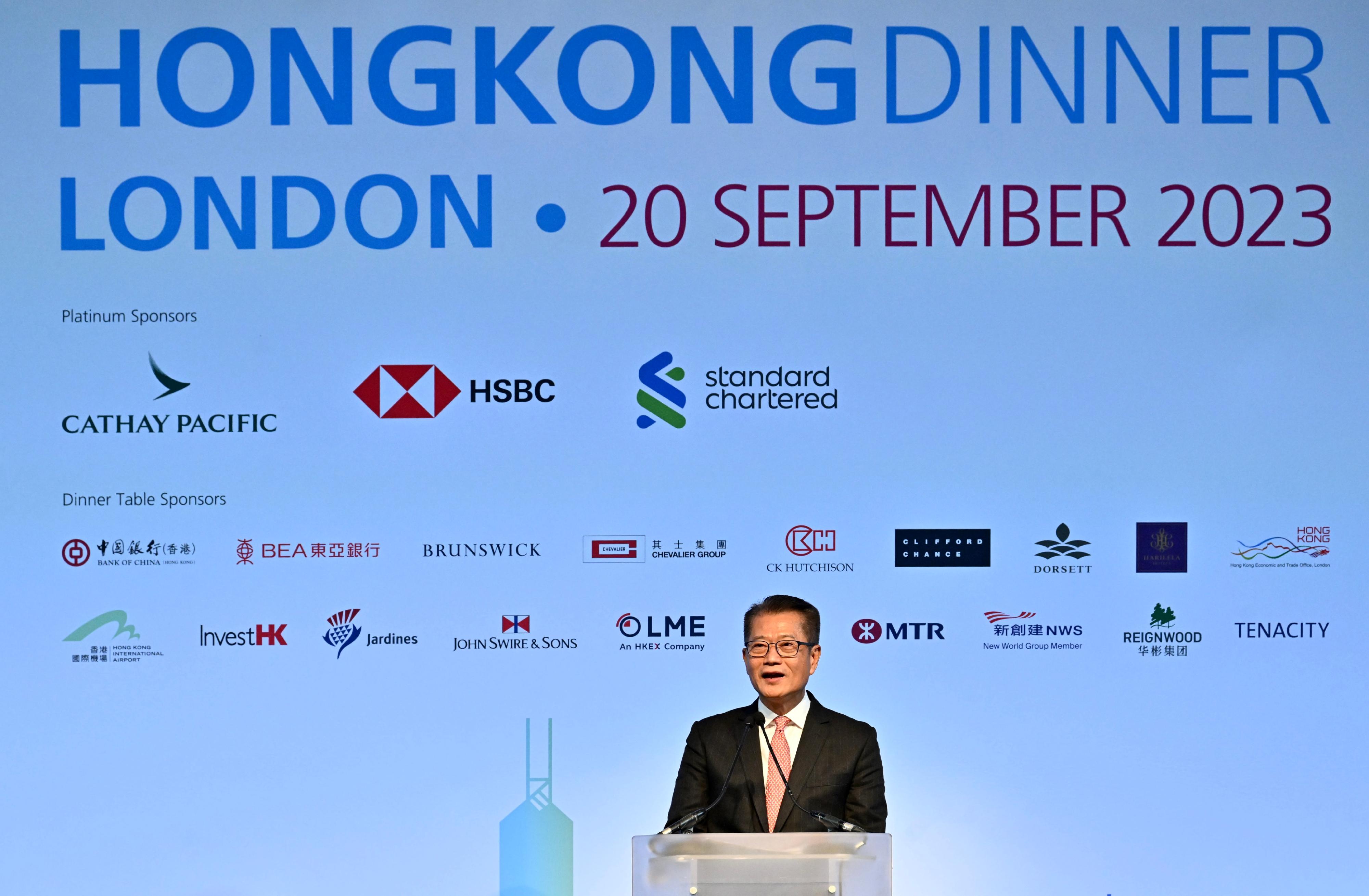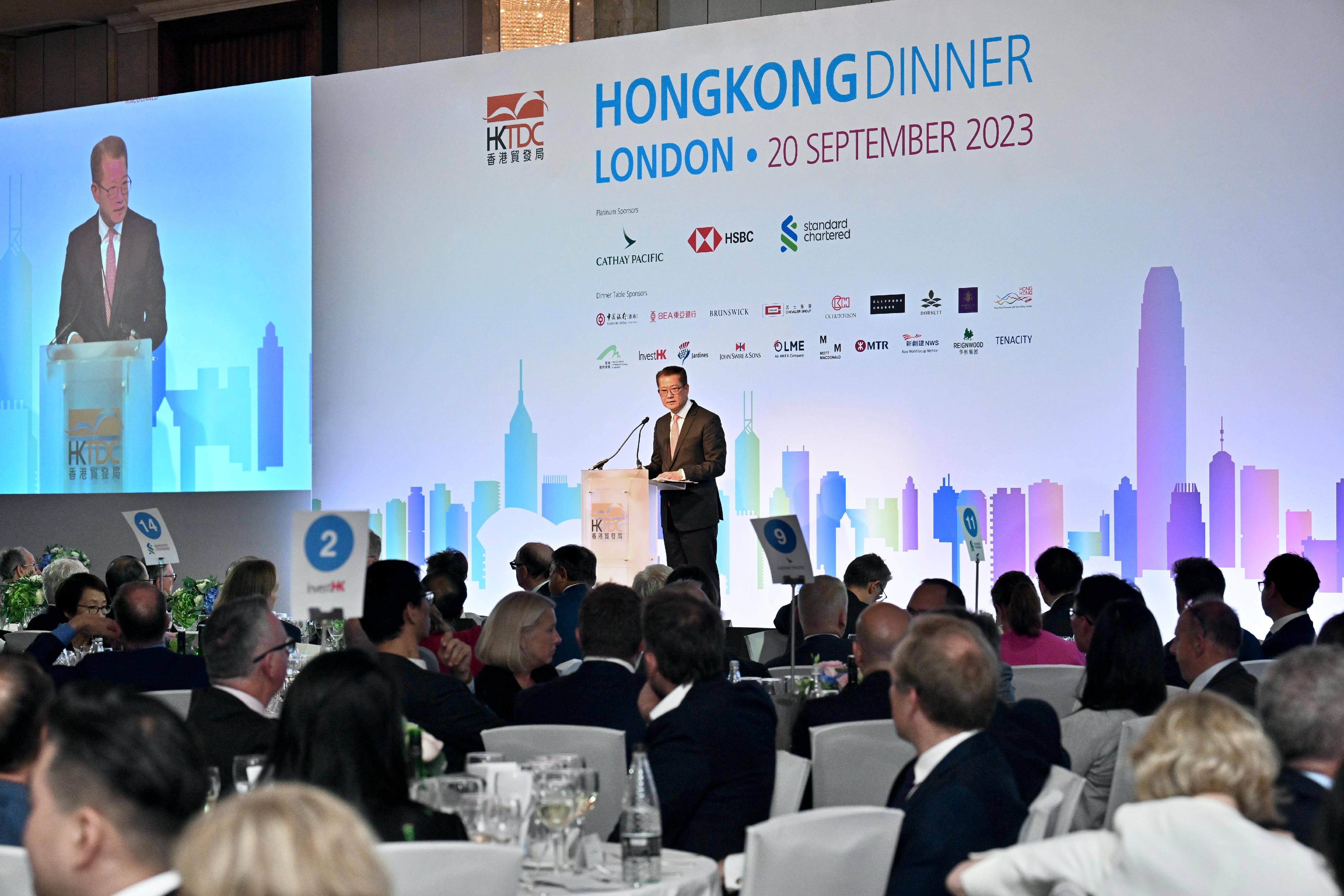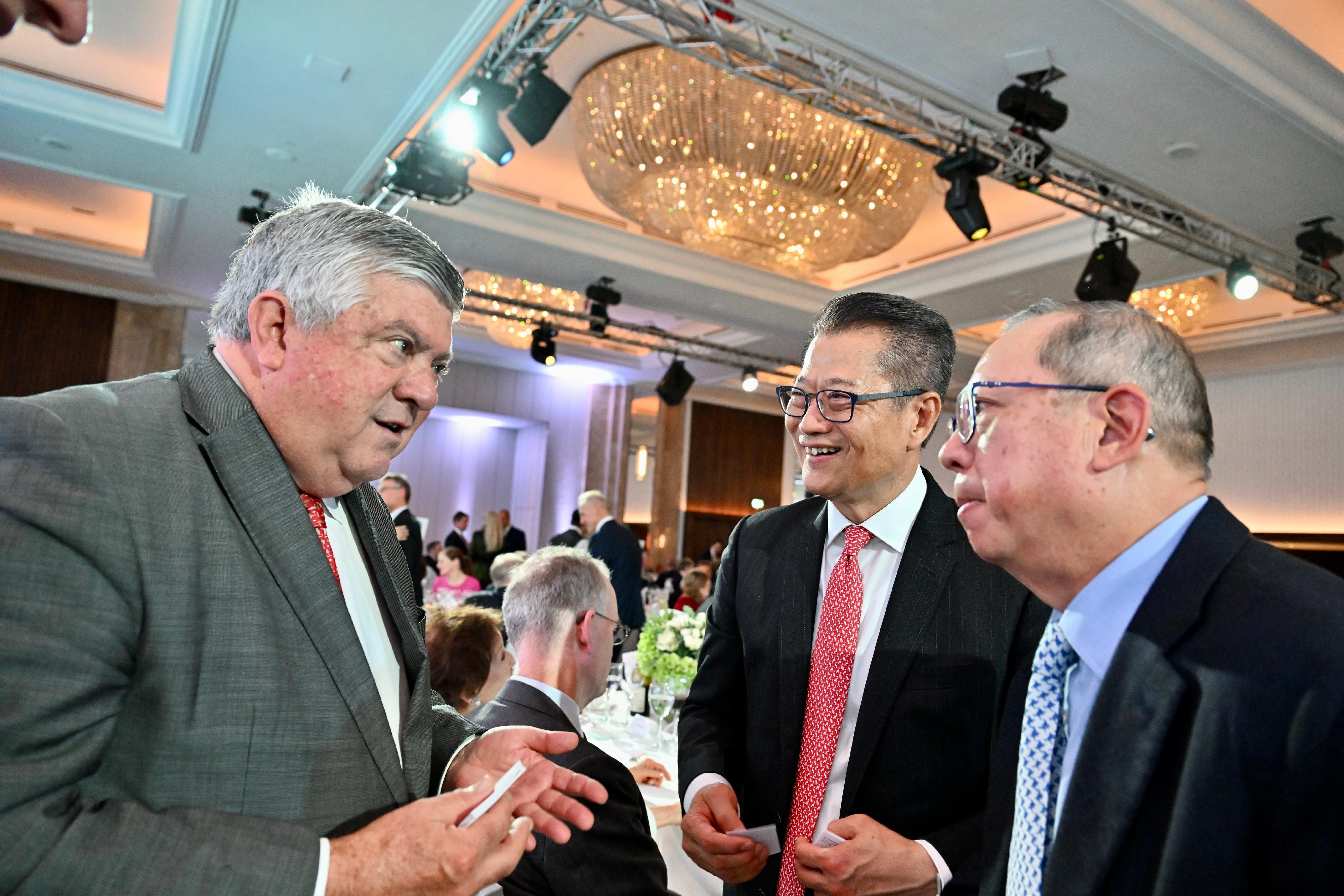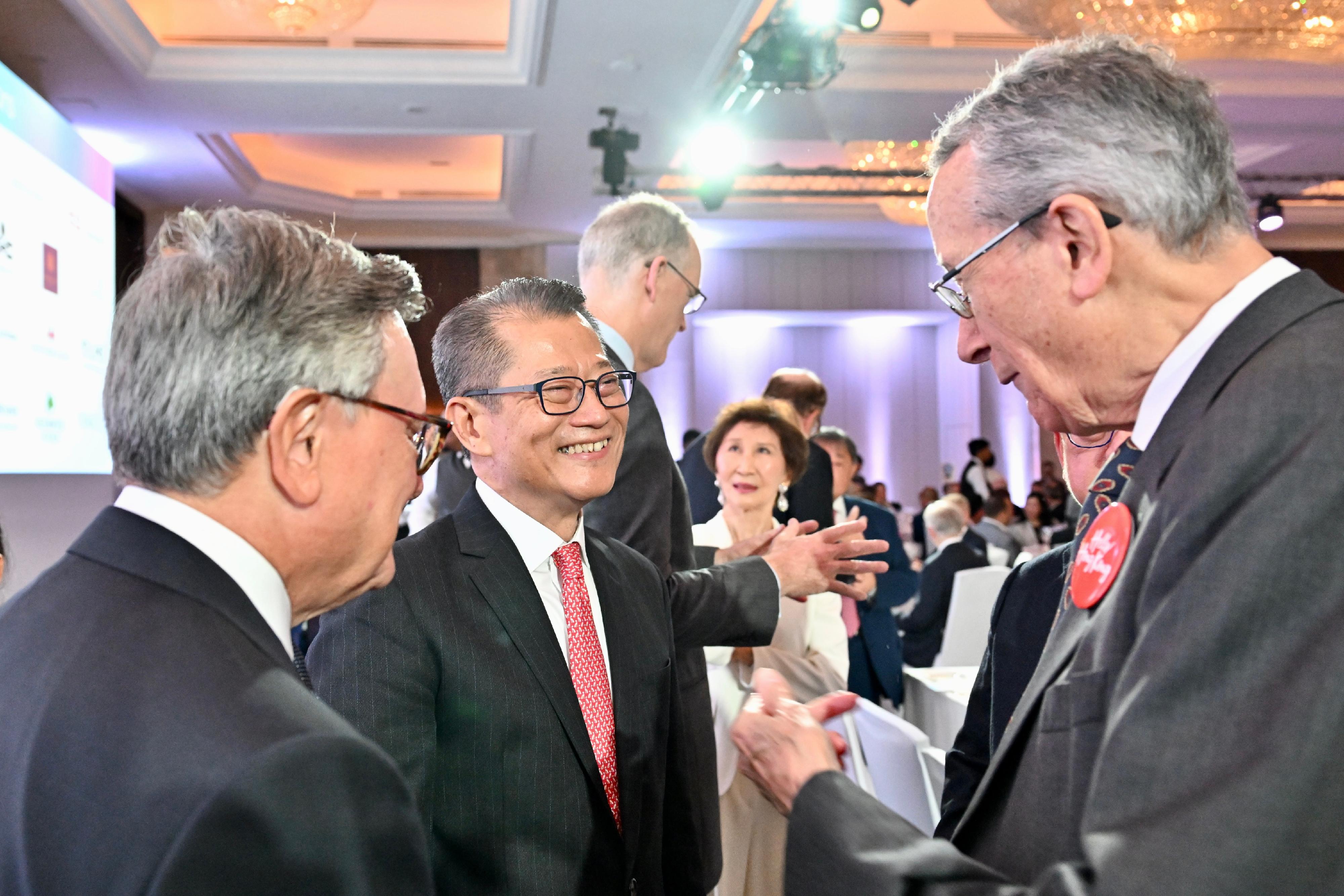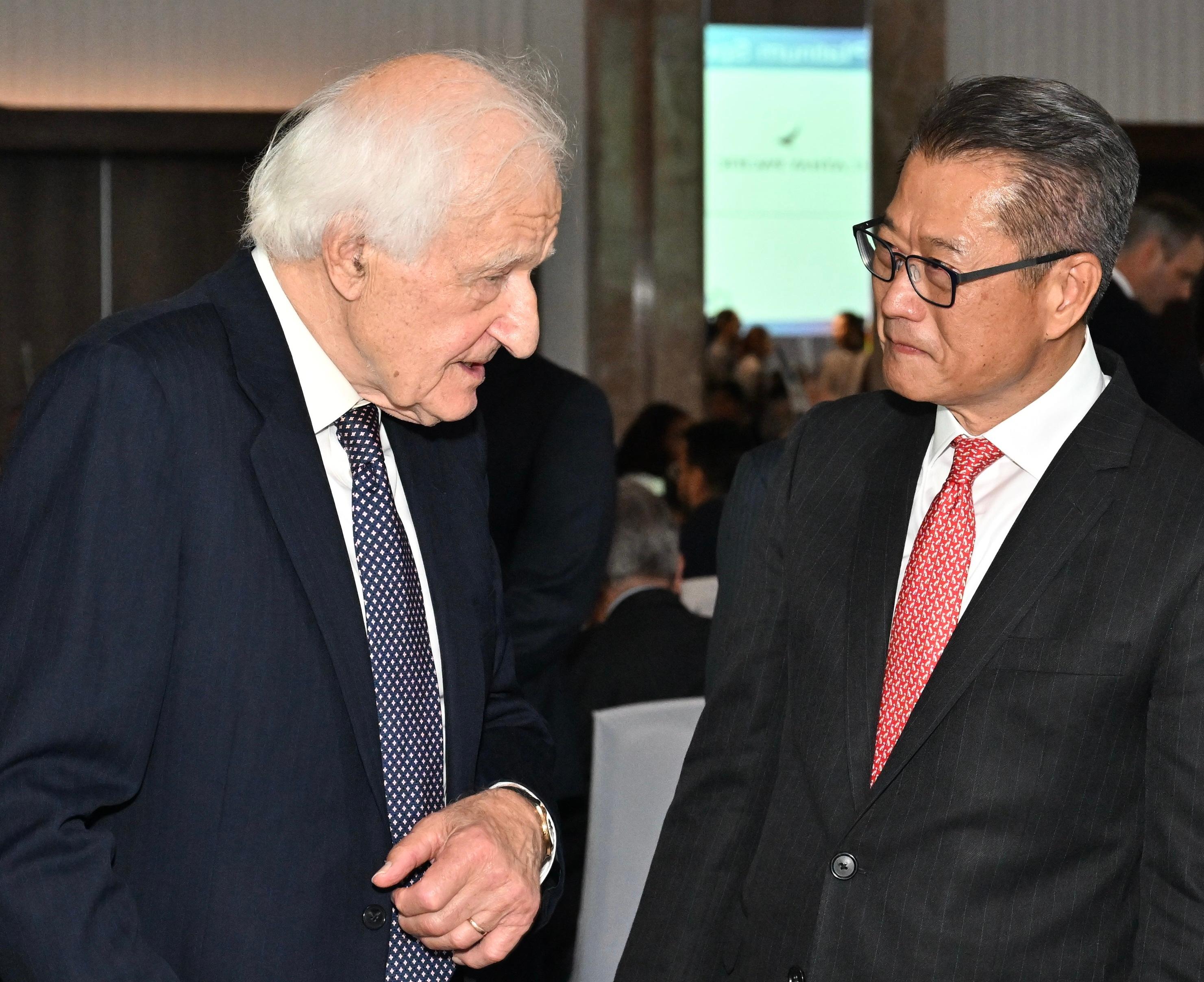Speech by FS at Hong Kong Dinner in London (English only) (with photos/video)
*****************************************************************************
Peter (Chairman of the Hong Kong Trade Development Council, Dr Peter Lam), Minister Wang (Minister Counsellor of Embassy of the People's Republic of China in the United Kingdom of Great Britain and Northern Ireland, Mr Wang Qi), ladies and gentlemen, friends of Hong Kong,
Good evening, and welcome to the Hong Kong Dinner in London, the 37th edition.
I want to say 37th annual edition but, to paraphrase Wordsworth, the world, and a pandemic, has been too much with us. So our last edition, the 36th, took place back in 2019.
I spoke to you then, too, as some of you may recall. A great deal has changed, of course, over the past four years – and not just how much older I look.
One thing that hasn't changed is the thrill, the pure unadulterated pleasure, I get being in London, perhaps the Western world's pre-eminent global city.
And one of the reasons I'm delighted to be here, tonight, at this venerable institution – this grand coming together of East and West over dinner, drinks and enduring friendship – is to bring you up to date on Asia's world city. And, no, it is of course not Singapore.
Welcome back to Hong Kong
Let me begin with business. For Hong Kong and the United Kingdom, for the global economy as a whole, it has been a challenging few years.
Beyond the pandemic, and its protracted ills, Hong Kong – as you well know – experienced significant social unrest in 2019.
Even so, our ties remain strong. As Peter noted a few minutes ago, our bilateral trade is solid. And we're still home to more than 650 UK companies and thousands of UK expats – most if not all of them happy that business, and rugby, are back in Hong Kong. That, I'd say, speaks well of our traditionally strong cultural ties and longstanding people-to-people bonds.
Hong Kong maintains substantial infrastructure investment in the UK, including Port of Felixstowe. And our MTR runs the Elizabeth line, helping to keep the London Underground flowing. And on time!
Life in Hong Kong has recovered and our economy is picking up, though the challenging external environment is a drag on our exports. Tourism, too, is returning. We were at about 80 per cent of pre-pandemic levels in August. And our air passenger traffic capacity is expected to reach 80 per cent capacity by year's end, with full recovery next year. With improving spending, I expect economic growth of four to five per cent in 2023.
The return of major events to Hong Kong, and the overwhelming response they're getting, is also boosting confidence. More than 6 000 people, many of them senior ministers and high-profile business leaders, took part in the Belt and Road Summit earlier this month.
Our annual FinTech Week, opening October 30, will again attract thousands. So, too, will the Global Financial Leaders' Investment Summit in November. Interest is also high in December's inaugural PRIORITY Asia Summit, organised by the Saudi Arabia-based FII (Future Investment Initiative) Institute.
If Hong Kong is losing its identity and competitiveness, as some of the media have been reporting, it's certainly not stopping the tens of thousands of business and government leaders returning to Hong Kong.
"One country, two systems", firm as ever
After all, Hong Kong's singular "one country, two systems" principle remains very much in place.
Maintaining the principle is firmly in our country's interest. Indeed, last July President Xi Jinping said that the Central Government cherishes Hong Kong's unique roles in connecting the world with the backing of the Mainland.
These "connector" roles require Hong Kong to remain a trusted hub for international investors and businesses. They require Hong Kong to maintain the salient features of "two systems": the common law system, a judiciary that exercises powers independently, the free flow of capital, goods, information and talent, and all the other advantages that have made Hong Kong what it is.
Clearly, "one country, two systems" was not designed for short-term expediency but for the long-term interest of our country. So let me add that it is with us for the long haul, as President Xi has reiterated on several occasions over the past year.
Rule of law
Take rule of law as an example. I know this is an issue dear to many of you who continue to follow Hong Kong news and business. It is no less dear to us. And I can report that we are doing as well as, or better than many Western countries in this respect. Last year, the "Rule of Law Index", published by the World Justice Project, ranked Hong Kong 22nd out of 140 countries and jurisdictions. If you're wondering, the United States 26th.
Our judiciary illustrates this best. It continues to make judgements impartially, without fear or favour. In one hot-off-the-press ruling, on same-sex relationships, for example, the Government was partly defeated and will need to develop a policy recognising the rights of same-sex partnerships.
Our legal aid system ensures that defendants in criminal cases get proper representation and their lawyers properly remunerated. Indeed, our legal aid costs run about 130 million pounds a year.
National Security Law
Some of you, I know, wondered about the impact of the National Security Law in Hong Kong. The facts, and those who live in Hong Kong, will tell you there is no need to succumb to pessimism.
As a major foreign chamber of commerce in Hong Kong recently reported, and I quote, "the international business community in Hong Kong has not seen any clear cases in which the NSL (National Security Law) has been applied to commercial business."
In fact, the amount of deposits in our banking system stood at about 1.6 trillion pounds in June – about 10 per cent higher than it was prior to the implementation of the National Security Law. The number of companies in Hong Kong with parent companies from outside the territory has remained at about 9 000 over the past five years.
A bright future
In short, you can continue to take confidence in Hong Kong and the advantages and boundless opportunities we offer – for UK business. For your business.
And the opportunities will only grow as we embrace the new frontiers now opening for us.
Allow me, for the next several minutes, to focus on financial services and innovation and technology, the dual engines that will drive Hong Kong's economic future.
International financial centre
Hong Kong has all the requisite strengths of an international financial centre: market size, liquidity, infrastructure, talent, balanced regulation aligning with the best international standards, and, above all, the common law.
Over the past few years, we have been continuously enhancing the competitiveness of our listing platform. For example, allowing pre-profit or pre-revenue biotech companies, and new economy companies with weighted voting right structures, to list on our stock exchange. The results speak for themselves. We are now global no. 2 in biotech fund-raising. And new-economy companies now represent about one-fourth of our stock market capitalisation and daily transaction value, even though they constitute only a tenth of the companies listed.
A prime advantage of our financial market is the Connect Schemes with the Mainland. Since introduction in 2014, they have been broadened and deepened to include not just shares, but also bonds, ETFs (Exchange Traded Funds) and derivatives. Hong Kong is the ideal platform for international companies to get listed since they can access both international and Mainland capital.
Hong Kong is Asia's prime asset-and wealth-management centre. We manage some 3.7 trillion pounds of assets, with two-thirds of that coming from outside Hong Kong. And we're working hard to attract family offices and enhance the Wealth Management Connect schemes with the Greater Bay Area to attract more funds.
Given the growing importance of the Renminbi as a currency for trade settlement and reserve, Hong Kong has become the offshore Renminbi business hub, and has much to offer. We hold about one trillion in Renminbi deposits, and handle 75 per cent of the world's Renminbi trade settlements. And we will continue to expand our Renminbi-denominated investment and risk-management products to suit users' needs.
Innovation and Technology
Turning to I&T (innovation and technology), Hong Kong's rise as an innovation and technology centre embraces the vision of the Greater Bay Area. We have excellent scientific research, trusted intellectual property rights protection, and sophisticated financial services, neighbouring Mainland cities are strong in technological innovation, commercialisation, and advanced manufacturing. Together, we are combining the strengths of the San Francisco Bay Area and the New York Bay Area.
We are all out to attract enterprises in areas such as life and health science, AI and big data, fintech, advanced manufacturing, new materials and new energy to Hong Kong.
We are offering special facilitation measures – covering land grant, financing, tax concessions. And we stand ready to co-invest. If the companies want to bring in talent, our doors are wide open. Over the past eight months, we have already attracted some US$2 billion initial investment from such companies, most of which will settle in our Northern Metropolis bordering Shenzhen.
More innovative policies are being taken forward in the Northern Metropolis to deepen our I&T collaboration with Shenzhen. For example, although Hong Kong and the Mainland maintain distinct data regimes, Mainland data will be made available to Hong Kong for use in the joint science park in the Northern Metropolis. Great news for businesses in health science and AI.
Green Tech and Green Finance
Let me touch on one more area: green transition. Green is very much a global agenda. And Hong Kong is determined to become an international green tech and green finance centre.
We are Asia's leader in green finance. The green and sustainable debts we issued last year totalled US$80 billion, and the bonds issued accounted for more than one-third of the Asian market.
With Science Park and Cyberport, our green tech base is also thriving.
Coupled with the high-tech sister cities in the Greater Bay Area, we envision that a complete financial and industry chain can be built to drive global green transition.
Investment in infrastructure
To support our ambitious development plans, we will invest heavily in infrastructure including the Northern Metropolis and a large reclamation project at Kau Yi Chau. We estimate that the infrastructure spending in the coming two decades will be over 30 billion pounds a year. We welcome UK businesses, consultants and professionals to join us in realising these opportunities. And we will deliver what we have promised.
Ladies and gentlemen, Hong Kong's long-term potential – and the opportunities it offers you and your business – is greater than ever.
I invite you to come back, to see for yourself. If not for a world of business, then come for a city ablaze in lights and lanterns, not to mention moon cakes. Yes, Hong Kong's Mid-Autumn Festival returns in glowing splendour over the last several days of September.
If you can't make it for the moon this month, I hope to see you, over the moon, at the Hong Kong Sevens in April!
My thanks to the Hong Kong Trade Development Council for organising this year's Hong Kong Dinner in London.
I know you will enjoy this memorable evening, and the good company all about you. And I look forward to seeing you soon in Hong Kong.
Thank you.
Ends/Thursday, September 21, 2023
Issued at HKT 9:00
Issued at HKT 9:00
NNNN



